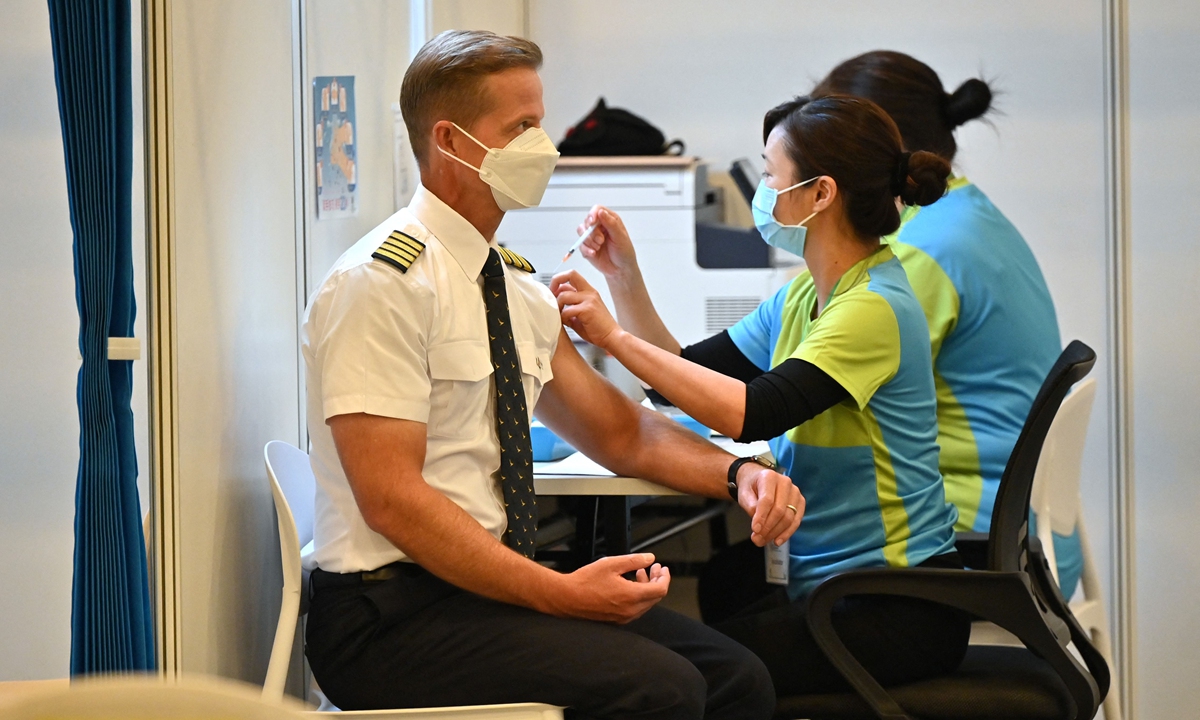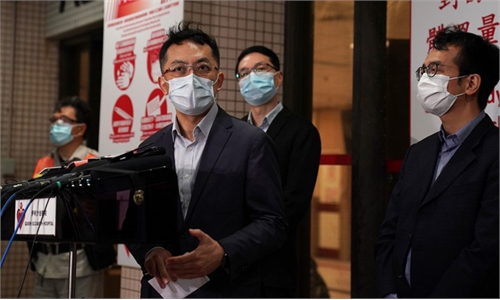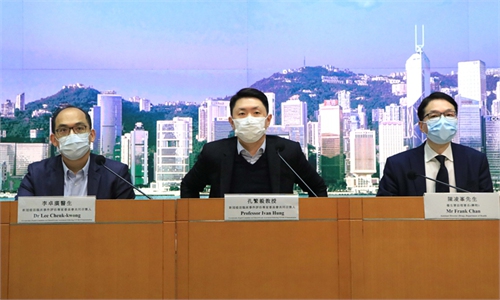Serious adverse reactions of Sinovac COVID-19 vaccine in HK are within the expected range: local expert team

A Cathay Pacific pilot gets the Sinovac COVID-19 vaccine at a community vaccination center in the Hong Kong Central Library on February 23, 2021. Photo: VCG
In response to some media speculating about a second Hong Kong resident dead on Saturday from a stroke after taking the Sinovac COVID-19 shot, local vaccine experts said there was no data to confirm if the injections might cause a stroke.
They stressed that Hong Kong's vaccination program will not be suspended. The existing figure of 0.002% of serious adverse reactions was within the expected range of the local expert team.
While the news that a 55-year-old woman died three days after receiving the Sinovac COVID-19 vaccine have spread, Hung Fan Ngai Ivan, the head of the committee assessing clinical cases related to vaccines in Hong Kong, pointed out that the patient was a long-term sufferer of high blood pressure, high cholesterol, diabetes and very likely died of acute stroke.
Hung said that the case still requires further investigation to establish whether there is a direct link between the death of the patient and the administration of the vaccine, adding that the vaccination plan in the city would continue as planned, Hong Kong media outlet hk01.com reported.
According to Hung, during the week of February 26 to March 4, about 61,500 Hong Kong residents received the Sinovac COVID-19 vaccine. Only 17 people, 0.002% of all vaccinated, had unintended adverse reactions, with dizziness and palpitations as the most reported symptoms. All patients received medical attention and have recovered since, Singaporean news outlet Lianhe Zaobao reported.
On March 3, Hung spoke at a press briefing on behalf of the committee members to announce the preliminary findings on the death of a Hong Kong elderly that passed away two days after receiving the shot. Hung pointed out that the autopsy report showed that the 63-year-old man had severe coronary heart disease and his death was not directly related to the Sinovac's vaccine.
However, after the death of the elderly man, many self-proclaimed independent media in Hong Kong groundlessly defamed Sinovac's vaccine as unsafe and rammed the Hong Kong SAR government for avoiding its responsibility. Some anti-China organizations even clamored that the introduction of the Sinovac vaccine into Hong Kong was a political show and called on the public not to receive the COVID-19 vaccine produced on the mainland.
With the emergence of fatal cases and media defamation, the enthusiasm of Hong Kong residents to get the vaccine has declined and some have cancelled their appointments to get the Sinovac COVID-19 shot. The first batch of Pfizer-BioNTech's mRNA COVID-19 vaccines, which started its reservation on Wednesday, has not been warmly received either, Hong Kong local media reported.
"Both death cases in Hong Kong occurred in patients with long-term underlying diseases. It is highly likely that the cases were simply coincidences and unrelated to the Sinovac vaccine," a medical expert on vaccines surnamed Jiang from the northeastern province of Jilin, told the Global Times on Sunday, claiming the criticism against Sinovac and the Hong Kong local government in some media was mainly for political purposes.
Jiang noted that, due to the large number of COVID-19 vaccines administered, it was normal to have very rare cases of adverse reactions.
Wang Yuedan, a professor of the Department of Immunology at Peking University, told the Global Times that, compared to the mRNA COVID-19 vaccines, which carries lipids that may cause serious adverse reactions, the Sinovac vaccine uses a more mature inactivation technology and has a higher safety profile.
"China has developed a comprehensive monitoring and recording system for serious adverse reactions to vaccines, and current data showed that most healthy people taking the Sinovac vaccine would not experience serious adverse effects," Jiang said.
But Jiang also noted that some specific populations, such as people with serious chronic diseases, should seek medical advice before taking the vaccine. It is suggested that they take the vaccine shot after their condition has been effectively controlled, said Jiang.


